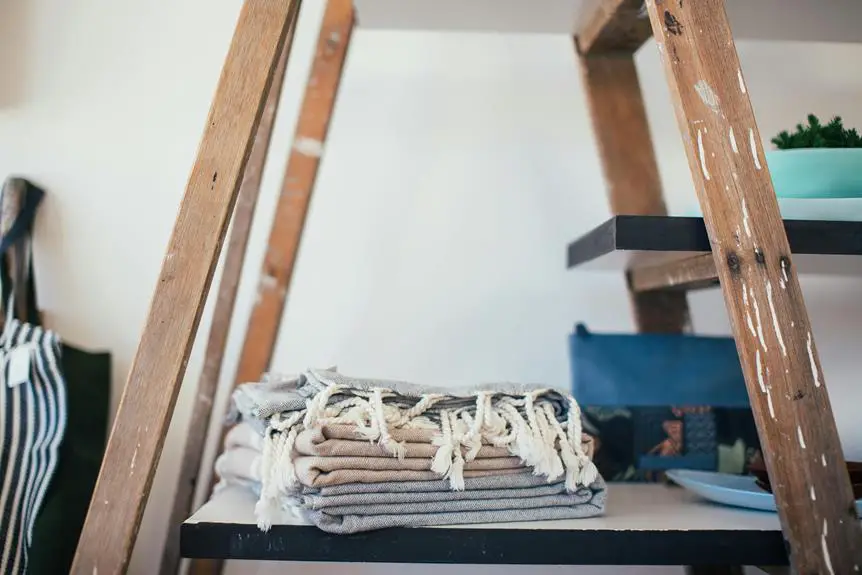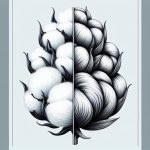When you're considering cotton options, you might wonder how ring spun cotton stacks up against Pima cotton in terms of quality. While both have their merits, they cater to different needs and preferences that can influence your choice. Ring spun cotton offers a soft, comfortable feel ideal for everyday use, while Pima cotton is often celebrated for its luxurious softness and longevity. Understanding the nuances between these two types can significantly impact your selection process. So, what specific traits set them apart, and how might that affect your next purchase?
Table of Contents
Understanding Ring Spun Cotton
Ring spun cotton is produced by twisting and thinning the fibers, creating a stronger and softer yarn that's ideal for high-quality fabrics. This spinning process involves pulling and twisting shorter fibers together, which results in a tighter, more durable strand. When you feel garments made from ring spun cotton, you'll notice the smooth texture and breathable quality that often outshines regular cotton.
By using ring spun cotton, you're investing in a fabric that withstands wear and tear far better than alternatives. It's less prone to fraying and fading, which keeps your clothes looking fresh for longer periods. Additionally, because it produces a finer yarn, you get a lighter fabric that still maintains warmth and comfort.
When you choose ring spun cotton for your wardrobe, you're selecting pieces that provide both style and functionality. Whether it's t-shirts, sheets, or other everyday items, its versatility makes it a popular choice. Understanding ring spun cotton helps you make informed decisions in fabric selection, ensuring you enjoy the benefits of a higher quality textile.
Ultimately, this choice can enhance your comfort and satisfaction with each wear.
Characteristics of Pima Cotton
When it comes to Pima cotton, you'll notice its impressive fiber length and strength right away.
This not only contributes to its renowned softness but also enhances its durability compared to other cotton types.
You'll appreciate how these characteristics make Pima cotton a premium choice for your fabric needs.
Fiber Length and Strength
Pima cotton stands out for its exceptional fiber length and strength, making it a favorite among those seeking durable and high-quality fabrics. When you choose Pima cotton, you're opting for longer fibers, typically measuring 1.4 to 2 inches, compared to the shorter fibers found in standard cotton varieties. This increased fiber length means fewer splices in the fabric, resulting in a smoother finish that's less prone to fraying or unraveling.
The strength of Pima cotton fibers also surpasses that of ordinary cotton. You'll find that its tensile strength enables the fabric to withstand wear and tear, giving you excellent longevity in your clothing and home textiles. This strength allows Pima cotton products to hold their shape, resist fading, and maintain a vibrant appearance over time.
Pima cotton's remarkable fiber characteristics not only contribute to its durability but also enhance its ability to handle dye effectively, ensuring rich and vivid colors. This makes Pima a popular choice for luxury items like sheets, shirts, and towels, where quality and resilience are paramount.
Softness and Durability
With its longer fibers and superior strength, Pima cotton also offers unmatched softness, making it incredibly comfortable against the skin while retaining remarkable durability. You'll notice the difference as soon as you touch it; the smooth texture feels luxurious, inviting you to wear it repeatedly.
Unlike standard cotton, Pima cotton's fibers prevent pilling, ensuring that your garments stay looking fresh longer. This durability means that even after multiple washes, your Pima cotton items won't lose their shape or softness, providing long-lasting wear.
In everyday use, you'll appreciate how Pima cotton resists fading and wrinkles, making it an excellent choice for both casual and formal clothing. It's perfect for those days when you want to feel relaxed yet polished.
Pima cotton isn't just about comfort; it's built to withstand the daily grind. You can trust it to maintain its quality over time, whether you're lounging at home or heading out for the day.
In choosing Pima cotton, you're investing in luxury that lasts, ensuring you enjoy its softness and durability for years to come.
Manufacturing Process Comparison
The manufacturing processes for ring spun cotton and Pima cotton reveal distinct techniques that significantly impact their texture and durability. When you consider ring spun cotton, it begins with carding, followed by a twisting process that creates a tighter, stronger yarn. This method not only enhances durability but also results in a finer, smoother finish. On the other hand, Pima cotton starts with long-staple fibers that are combed to remove short fibers. This contributes to fewer tangles in the yarn while allowing a luxurious, silky feel.
Here's a simple comparison of their manufacturing processes:
| Feature | Ring Spun Cotton |
|---|---|
| Fiber Preparation | Carding |
| Yarn Production | Twisting |
| Texture | Smooth and Compact |
| Durability | High |
| Fiber Length | Variable |
| Feature | Pima Cotton |
| Fiber Preparation | Combing |
| Yarn Production | Spinning |
| Texture | Luxurious and Soft |
| Durability | Very High |
| Fiber Length | Long Staple |
Softness and Comfort Levels
When you consider softness and comfort in cotton fabrics, the texture and feel can make all the difference.
You'll appreciate how breathability and moisture-wicking properties enhance your overall experience.
Let's compare how ring spun cotton stacks up against Pima cotton in these key areas.
Texture and Feel
Ring spun cotton feels smooth against your skin, while Pima cotton offers an even silkier sensation that elevates comfort levels. When you wear ring spun cotton, you'll notice its fine, soft texture that wraps around you gently, making it a great choice for everyday use. This type of cotton has been tightly twisted to create a finer yarn, which enhances its softness, creating a comfortable feel on your body.
On the other hand, Pima cotton is known for its luxurious texture. The longer fiber lengths in Pima cotton provide a sheen and softness that stays remarkable wash after wash. You might find that Pima cotton feels cooler and smoother, making it an excellent option for those warm days when you want that extra touch of comfort.
Both types excel in providing comfort, but Pima cotton may have the edge in terms of a silky feel. If you're prioritizing a soft texture in your clothing or bedding, consider trying Pima cotton for an indulgent experience.
Ultimately, your choice will depend on your lifestyle needs, but you can't go wrong with either option for everyday comfort.
Breathability and Moisture Wicking
While both ring spun cotton and Pima cotton excel in comfort, their breathability and moisture-wicking properties can significantly enhance your overall experience.
Ring spun cotton is known for its durability and softness, providing a comfortable fit while allowing airflow. Its tighter weave helps wick moisture away from your skin, making it a solid choice for everyday wear, especially during warmer months.
On the other hand, Pima cotton takes breathability to another level. Its extra-long fibers create a finer fabric that not only feels soft but also promotes better ventilation. This means it can handle humidity better, keeping you dry and comfortable throughout the day. Pima cotton's moisture-wicking abilities are often preferred for active lifestyles or hot climates.
In practical terms, if you're looking for a relaxed, breathable option, ring spun cotton is fantastic for casual outfits.
However, if you prioritize moisture management and breathability for sports or extended outdoor activities, Pima cotton is your best bet.
Ultimately, both options offer unique advantages that enhance comfort, but your choice should align with your specific needs and lifestyle.
Durability and Longevity
Durability and longevity set Pima cotton apart from ring spun cotton, making it a favored choice for those seeking long-lasting fabric. When you invest in Pima cotton, you're getting fibers that are stronger and more resilient, which means your clothing or home textiles can withstand more wear and tear over time. In contrast, ring spun cotton's shorter fibers result in a softer but less durable fabric.
Here's a quick comparison to highlight the differences:
| Feature | Pima Cotton | Ring Spun Cotton |
|---|---|---|
| Strength | High | Moderate |
| Resilience | Excellent | Good |
| Fade Resistance | Superior | Fair |
| Lifespan | Long-lasting | Shorter |
Choosing Pima cotton means opting for a fabric that not only feels luxurious but also stands the test of time. Whether you're looking for clothing or bedding, Pima cotton maintains its quality longer, giving you added value in your purchase. So, if durability and longevity are high on your priority list, Pima cotton is undeniably the smarter choice.
Cost Considerations
When considering cost, Pima cotton typically commands a higher price due to its superior quality and durability compared to ring spun cotton. This can make Pima a more expensive investment upfront, but many find the benefits worth it.
The luxurious feel and long-lasting nature of Pima cotton can lead to savings over time, as you won't need to replace items as frequently.
On the other hand, ring spun cotton is generally more budget-friendly, making it an appealing option for those who want quality without breaking the bank. Its softness and decent durability make it a suitable choice for everyday wear and uses.
It's important to balance your budget with your specific needs. If you're looking for clothing or textiles that will see heavy use, investing in Pima may save you costs in the long run. However, if you're shopping for items that won't endure as much wear, ring spun cotton might be the perfect fit.
Ultimately, weigh the upfront costs against potential longevity for the best value. Choosing wisely can lead you to the right cotton type that suits both your wallet and lifestyle.
Choosing the Right Option
Deciding between ring spun cotton and Pima cotton ultimately comes down to your specific needs, preferences, and how you plan to use your textiles. If you're looking for everyday comfort and durability, ring spun cotton is a great choice. It's softer and more flexible, making it ideal for t-shirts and casual wear. On the other hand, if you're after luxury and superior softness for items like upscale sheets or fine garments, Pima cotton is the way to go.
To help you visualize, consider this comparison:
| Feature | Ring Spun Cotton |
|---|---|
| Softness | Soft, comfortable |
| Durability | High, withstands wear |
| Feature | Pima Cotton |
| Softness | Ultra-soft, silky feel |
| Durability | Very high, long-lasting |
Ultimately, whether you opt for ring spun or Pima cotton depends on the balance between cost and the level of luxury you're looking for. Whichever you choose, both options offer quality that can elevate your textile experience.
Frequently Asked Questions
Is Ring Spun Cotton More Environmentally Friendly Than Pima Cotton?
You're right to consider environmental impact. Generally, ring spun cotton often uses less water and chemicals in processing than traditional methods. However, Pima cotton requires specific growing conditions that may affect its overall sustainability.
Can Ring Spun Cotton Shrink More Than Pima Cotton After Washing?
Yes, ring spun cotton can shrink more than Pima cotton after washing. It's important to follow care instructions to minimize shrinkage. Pima's longer fibers generally resist shrinking better than the shorter fibers in ring spun cotton.
What Are the Care Instructions for Ring Spun and Pima Cotton?
You should wash ring spun and Pima cotton in cold water and tumble dry on low heat. Avoid bleach to maintain color and softness. Iron on a medium setting if needed for a polished look.
Does Ring Spun Cotton Have a Higher Thread Count Than Pima Cotton?
You might find that ring spun cotton doesn't inherently have a higher thread count than Pima cotton. Thread count varies based on specific fabric constructions rather than the spinning process, so it's best to check individual product specifications.
Are There Specific Brands Known for High-Quality Ring Spun or Pima Cotton?
Sure! You'll find brands like Bella+Canvas and American Apparel renowned for their high-quality ring spun cotton. For Pima cotton, look at brands like Peter Peppers and California Style that showcase exceptional softness and durability.
- How Does Ring Spun Cotton Affect Garment Fit and Shape Retention? - August 13, 2024
- What Are the Challenges in Producing Ring Spun Cotton? - August 13, 2024
- Is Ring Spun Cotton Suitable for Plus-Size Clothing? - August 13, 2024







